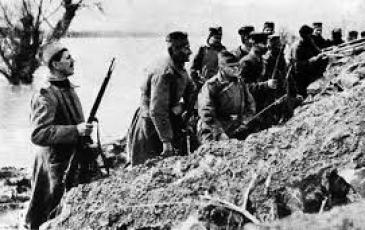1915_1007_01: Serbia Must Die! (4th Invasion) - FWWC 03 Serbia '14

 0 - 0 - 1
0 - 0 - 1

| Rating: | 9.7 (2) |
| Games Played: | 1 |
| SM: | 10 |
| Turns: | 389 |
| Type: | Stock |
| First Side: | Central Powers |
| Second Side: | Allied Powers |
Serbia, 7th October 1915:
1914 had not gone well for the Austro-Hungarian Empire. Three invasions of Serbia had failed catastrophically with over 270,000 casualties, and the campaign in Galicia had ended in defeat after the Austro-Hungarian armies were pushed back to the Carpathian Mountains, suffering a staggering 2.5 million losses in that campaign alone, that included some 500,000 prisoners. Potiorek and Frank were relieved of command, and the Balkan Front became static and purely defensive since Austria-Hungary had no additional resources to spare on further offensives on that front.
With a new Chief of the German General Staff, Erich von Falkenhayn, the war drastically changed in 1915 with shifting priorities. Out of the necessity, the Germans were forced to intervene in Galicia, and after a series of successful campaigns with the veteran and able Generalfeldmarschall August von Mackensen at the head of a German contingent, the combined German and Austro-Hungarian forces pushed the Russians out of Galicia and Poland. Von Falkenhayn's next target was Serbia, which stood in the way of the isolated Ottoman Empire that was in dire need of support as it suffered from the costly attritional warfare at Gallipoli.
With the prospect of Bulgaria joining the Central Powers after the German successes on the Eastern Front (and promises of annexation of Macedonia - a territory that Bulgaria felt was rightfully theirs), a two pronged invasion plan was drawn up that would again entrust the reliable von Mackensen with leading a multinational offensive, this time with the Austro-Hungarians and Bulgarians in support. Conrad protested the plan because the Balkans were supposed to be Austria-Hungary's exclusive domain, but given the disastrous failures suffered throughout 1914, and now with Italy joining the Allied Powers in May 1915, there was little he could do but accept the reality that the Austro-Hungarian Army was now relegated to a supporting role to the German war machine.
On October 7th, after an intense day long preliminary bombardment that reduced the city of Beograd to rubble, the German led attack commenced, with von Mackensen deploying his ace card that was so successful at Gorlice-Tarnow, Przemysl, and Lemberg some months before: a methodical and well planned initial attack supported by massive amounts of heavy artillery.
The heroic Serbian Army, the victors of the hard fought 1914 campaigns, were now faced with a serious threat on two fronts. However this time the Serbians were well prepared for the attack, having rebuilt their army and fortified likely invasion routes during the ten months since defeating the Austro-Hungarian third invasion in 1914. The Serbians were also hopeful that an Anglo-French intervention force from Salonika would come to their assistance, but if all else failed, as a last resort the Serbian Army was prepared to tactically withdraw from Serbia in order to live and fight another day on the Macedonian Front.
As German infantry crossed the Sava and Danube to set foot onto Serbian soil for the first time, Otto von Bismarck's well known words spoken at a Reichstag speech in 1876 must have been in the minds of their senior commanders: "the Balkans is not worth the bones of a single Pomeranian grenadier" --however 'little Serbia' had proven too great a threat to ignore; Serbia must die!
[Size: huge]
*IMPORTANT: The Serbians should avoid moving towards the Bulgarian border (turn on Map Areas to see the national borders), because Bulgarian units will receive an early army-wide triggered release if they have line of sight to enemy units, which would trigger an early offensive!
*IMPORTANT: This scenario is intended to be played either head to head or Central Powers versus AI (not Allied Powers versus AI).
*See the notes document for information on scenario design decisions and historical notes.
1914 had not gone well for the Austro-Hungarian Empire. Three invasions of Serbia had failed catastrophically with over 270,000 casualties, and the campaign in Galicia had ended in defeat after the Austro-Hungarian armies were pushed back to the Carpathian Mountains, suffering a staggering 2.5 million losses in that campaign alone, that included some 500,000 prisoners. Potiorek and Frank were relieved of command, and the Balkan Front became static and purely defensive since Austria-Hungary had no additional resources to spare on further offensives on that front.
With a new Chief of the German General Staff, Erich von Falkenhayn, the war drastically changed in 1915 with shifting priorities. Out of the necessity, the Germans were forced to intervene in Galicia, and after a series of successful campaigns with the veteran and able Generalfeldmarschall August von Mackensen at the head of a German contingent, the combined German and Austro-Hungarian forces pushed the Russians out of Galicia and Poland. Von Falkenhayn's next target was Serbia, which stood in the way of the isolated Ottoman Empire that was in dire need of support as it suffered from the costly attritional warfare at Gallipoli.
With the prospect of Bulgaria joining the Central Powers after the German successes on the Eastern Front (and promises of annexation of Macedonia - a territory that Bulgaria felt was rightfully theirs), a two pronged invasion plan was drawn up that would again entrust the reliable von Mackensen with leading a multinational offensive, this time with the Austro-Hungarians and Bulgarians in support. Conrad protested the plan because the Balkans were supposed to be Austria-Hungary's exclusive domain, but given the disastrous failures suffered throughout 1914, and now with Italy joining the Allied Powers in May 1915, there was little he could do but accept the reality that the Austro-Hungarian Army was now relegated to a supporting role to the German war machine.
On October 7th, after an intense day long preliminary bombardment that reduced the city of Beograd to rubble, the German led attack commenced, with von Mackensen deploying his ace card that was so successful at Gorlice-Tarnow, Przemysl, and Lemberg some months before: a methodical and well planned initial attack supported by massive amounts of heavy artillery.
The heroic Serbian Army, the victors of the hard fought 1914 campaigns, were now faced with a serious threat on two fronts. However this time the Serbians were well prepared for the attack, having rebuilt their army and fortified likely invasion routes during the ten months since defeating the Austro-Hungarian third invasion in 1914. The Serbians were also hopeful that an Anglo-French intervention force from Salonika would come to their assistance, but if all else failed, as a last resort the Serbian Army was prepared to tactically withdraw from Serbia in order to live and fight another day on the Macedonian Front.
As German infantry crossed the Sava and Danube to set foot onto Serbian soil for the first time, Otto von Bismarck's well known words spoken at a Reichstag speech in 1876 must have been in the minds of their senior commanders: "the Balkans is not worth the bones of a single Pomeranian grenadier" --however 'little Serbia' had proven too great a threat to ignore; Serbia must die!
[Size: huge]
*IMPORTANT: The Serbians should avoid moving towards the Bulgarian border (turn on Map Areas to see the national borders), because Bulgarian units will receive an early army-wide triggered release if they have line of sight to enemy units, which would trigger an early offensive!
*IMPORTANT: This scenario is intended to be played either head to head or Central Powers versus AI (not Allied Powers versus AI).
*See the notes document for information on scenario design decisions and historical notes.
| Gaming Records | |||||||||
|---|---|---|---|---|---|---|---|---|---|
| 1st Side Player | 2nd Side Player | Result | Score | ||||||
 |
ComradeP | vs. | Elxaime |  |
Allied Powers Minor Victory | 140 | 60 | ||





















